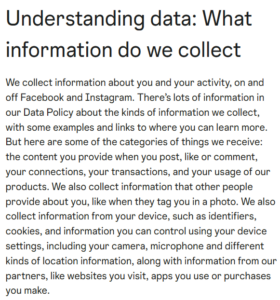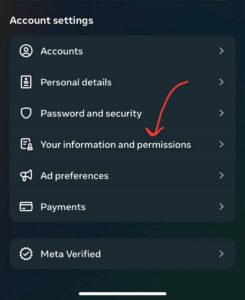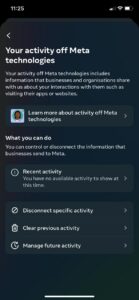It wouldn’t be incorrect to argue that in the modern day, data represents actual wealth. After all, it’s a world of information, and we are the source of information for social media giants like Instagram and Facebook. Any data collected in the form of information becomes extremely valuable to such companies.
To begin with, everything you do on Instagram is tracked. Nearly all internet services gather data about your activities. So, Instagram is aware that you scrolled through your ex’s profile at three in the morning. It even knows that you have been eyeing that one blouse for nearly a month. I can personally vouch for it because I’m sick of seeing Jordans on my timeline that are well beyond my spending limit. More often than not, it has motivated me to learn how Instagram is able to keep track of my browsing habits.
An analysis of the Instagram app by Felix Krause in 2022 revealed that it could track all of a user’s interactions, text selections, and even text input including passwords and confidential credit card information, whenever the user clicked a link within the app.
This information and the advertisements based on that information are the driving force behind Instagram’s success. It uses the personal data it has collected from Facebook integrations to present you with adverts that it believes you would click on. This information is derived from your use of the app and Facebook, as well as from your phone and browsing habits on websites that Facebook does not even control.
Fortunately, I have some good news. Meta now allows users to block Instagram from tracking their online activity. In order to provide you with more control and management over your data, it has extended its “Activity Off-Meta Technologies” feature to Instagram. With the Instagram app’s Accounts Centre portal, you may prevent particular companies from accessing your data or erase it all at once. Thankfully, I no longer have to worry about seeing the things I want to buy on my Instagram timeline when I browse shopping websites.
How does Instagram collect our information?
It’s crucial to understand how Instagram tracks and gathers our data before we can better understand this new function. According to Instagram’s Data Policy, they collect users’ data about their online and offline activities on the platform. Additionally, they get data about you from other sources. For instance, when someone tags you in a picture. Instagram also gathers data from their partners. It includes the websites you visit, apps you use, or purchases you make. Information about your device also plays a crucial role.

It is clear that Instagram uses a number of techniques to gather our data and monitor our activity. Some other ways Instagram keeps track of our activities include:
Cookies and related technologies
When you use Instagram or visit other websites that use Meta’s services, little data files called cookies are stored on your device. They assist Instagram in storing your preferences, displaying relevant advertisements, and evaluating the usefulness of its services.
Location information
This includes information about your approximate or precise location. It includes GPS coordinates, IP address, Wi-Fi access points, cell towers, and Bluetooth signals. This helps Instagram to show you content and ads that are relevant to your location.
Partner information
Instagram may also acquire information from other businesses that use Meta’s services or collaborate with Meta to offer you services in this regard. For instance, online retailers or advertisers may provide Meta with information about your purchases. It may even receive information about the advertisements you view or click on. This enables Instagram to display more tailored advertisements and deals to you.
The consequences of tracking activities
Before we learn more about this new Instagram feature, let us look back at some events that possibly led to this. I’m sure everyone would agree that data breaches have increased significantly in the last few years. To get a better idea of the timeline, you can look at it below. It specifically relates to Instagram-related data breaches and based on Firewall Times’ research.
In November 2015, it was discovered that the third-party app InstaAgent was transferring users’ Instagram usernames and passwords to unidentified servers after keeping them in an unencrypted format. As a result, the client was taken down from Google’s and Apple’s app stores.
Then in August 2017, news of a data breach affecting 6 million Instagram accounts surfaced. A defect in the Instagram developer API made it easy to extract email addresses and phone numbers associated with Instagram accounts. Although Instagram fixed the problem, it didn’t seem to happen quickly enough. Hackers published a website with a searchable database that claimed to hold the personal contact details of well-known users.
In March 2019, Meta revealed that it had unintentionally retained hundreds of millions of user passwords without encryption. These passwords were associated with Instagram, Facebook Lite, and Facebook accounts. In the company, these passwords were commonly known. Companies usually only keep encrypted passwords on file to safeguard sensitive data in the event of a cyberattack. For years, these passwords were readily accessible on Facebook.
A sizable database run by the outside business was uncovered online in May 2019. Chtrbox, a company that paid influencers for sponsored posts, was in charge of an unsecure Amazon Web Services server that exposed this data. Since the material wasn’t encrypted, it could be accessed without a password.
Another data leak that surfaced in August 2020 revealed 235 million profiles on YouTube, TikTok, and Instagram. A Comparitech security research team discovered an unprotected database that included complete names, genders, ages, and profile images. Certain records also contained phone numbers and email addresses. Additionally, the data was taken from open sources.
In January 2021, a data breach at SocialArks revealed 318 million records, encompassing around 214 million social media accounts, including Instagram. A misconfigured database was the source of the hack, which revealed the personal information of some individuals, including phone numbers and email addresses. Because the information was taken from open sources, Instagram’s terms and conditions were broken.
In the most recent breach, regulators in Ireland fined Instagram €405 million in September 2022 for breaching the protection of children’s data. In the complaint, it was claimed that when some users upgraded to corporate accounts without considering the ramifications, child data (specifically phone numbers and email addresses) was exposed.
The new feature lets you block Instagram from tracking web activities
Till now, we have established that Instagram tracks your online activities to personalize your experience. It is even done to show targeted ads to its users. It collects information from your app usage, phone activities, and even your browsing habits across the web. But occasionally, this data manages to get past privacy safeguards and ends up in the hands of hackers.
Moreover, in 2021, a report found that Instagram is one of the most invasive apps. They came up with the conclusion that Instagram gives over 79% of your data to other parties online. And it includes your browsing history as well as personal details. This revelation was uncovered by cloud storage company, pCloud, through analysis of the recently created App Privacy labels that businesses are now obligated to provide in Apple’s App Store.
So, on October 17, Meta announced that they are giving users more control over how Instagram tracks their web activity. Accordingly, you will now be able to see which companies are sharing information with Meta, disconnect specific activities, and clean the acquired data when you disable tracking on Instagram.

Currently available under the platform’s Accounts Centre, this function is known as Activity Off-Meta Technologies. Earlier, it was limited to Facebook users only. Meta has also extended its ‘Transfer Your Information control’ to Instagram. This will facilitate the easy transfer of users’ images and videos to other platforms and third-party services.
It all comes at a time when Meta is making changes to the way it approaches advertisements. The company is also battling new regulations it needs to follow in the EU. For this, it might even require opt-in for highly targeted advertisements.
Here’s how you can stop Instagram from tracking you
Granted, I haven’t had much control over Instagram tracking my activity up until now. But with Meta’s new feature I can finally have some control over my data. Here’s how you can utilize it with the help of a step-by-step guide.
- Open Instagram app and tap on your profile picture in the bottom right.
- Tap the three horizontal lines in the top right and select ‘Settings and privacy’ from the menu.
- Select ‘Accounts Center’, which is the first option on the screen.
- Then navigate to ‘Your information and permissions’.
- Tap on the ‘Your Activity off Meta Technologies’ option.



Now, you have a few choices here. You can either ‘Disconnect specific activity’, or ‘Clear previous activity’. Users can even choose to ‘Manage future activity’. This way, Meta won’t receive information about your interaction with various companies.
I believe that with this new feature, Meta is trying to give users more control and choice over their data and how it is used by Meta and other companies. This may be a response to the increasing concerns and regulations about data privacy and security in the digital world. However, some users may still be skeptical about how much Meta actually respects their privacy and whether these changes are enough to protect their data from misuse or abuse.
PiunikaWeb started as purely an investigative tech journalism website with main focus on ‘breaking’ or ‘exclusive’ news. In no time, our stories got picked up by the likes of Forbes, Foxnews, Gizmodo, TechCrunch, Engadget, The Verge, Macrumors, and many others. Want to know more about us? Head here.





